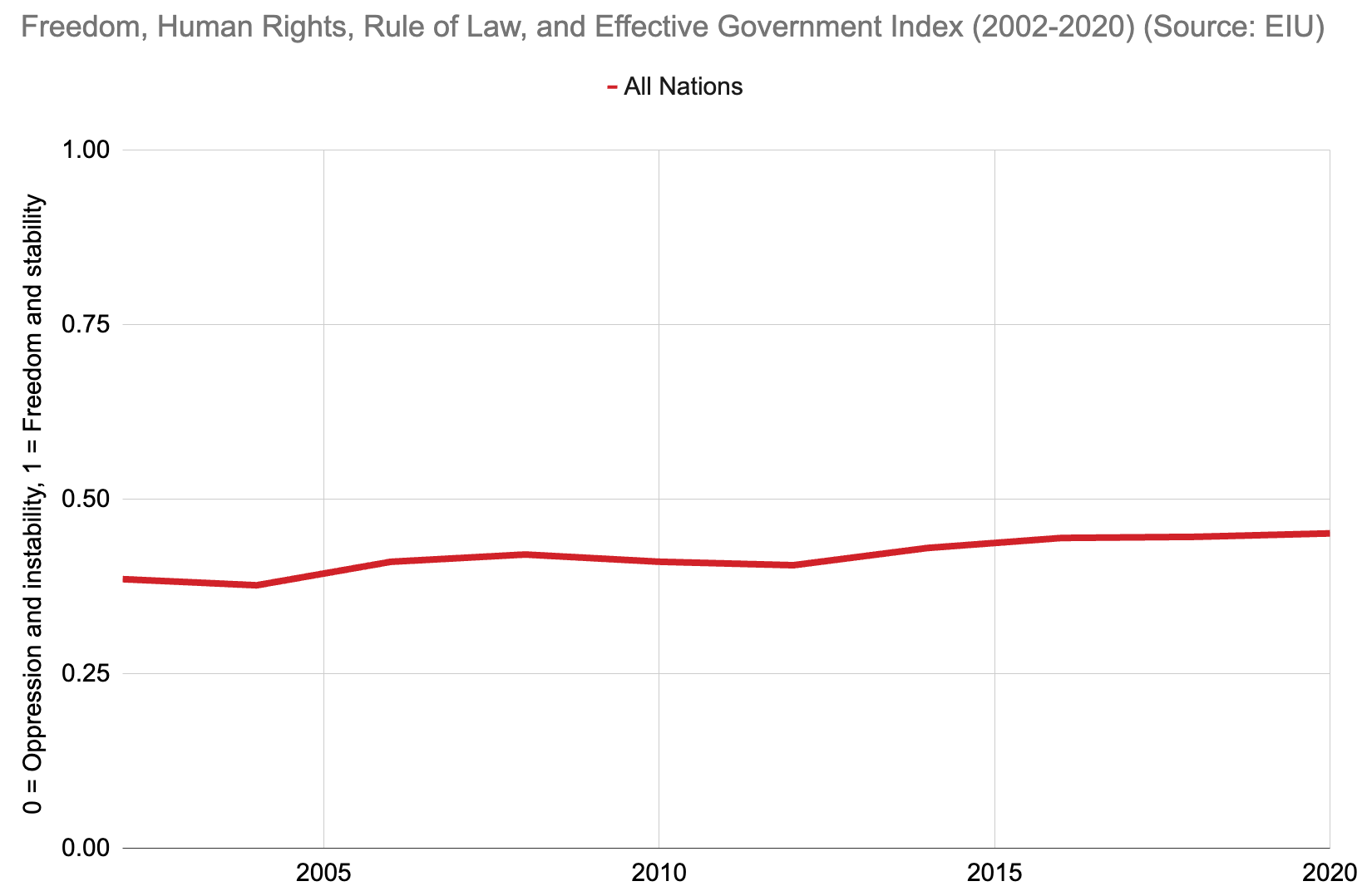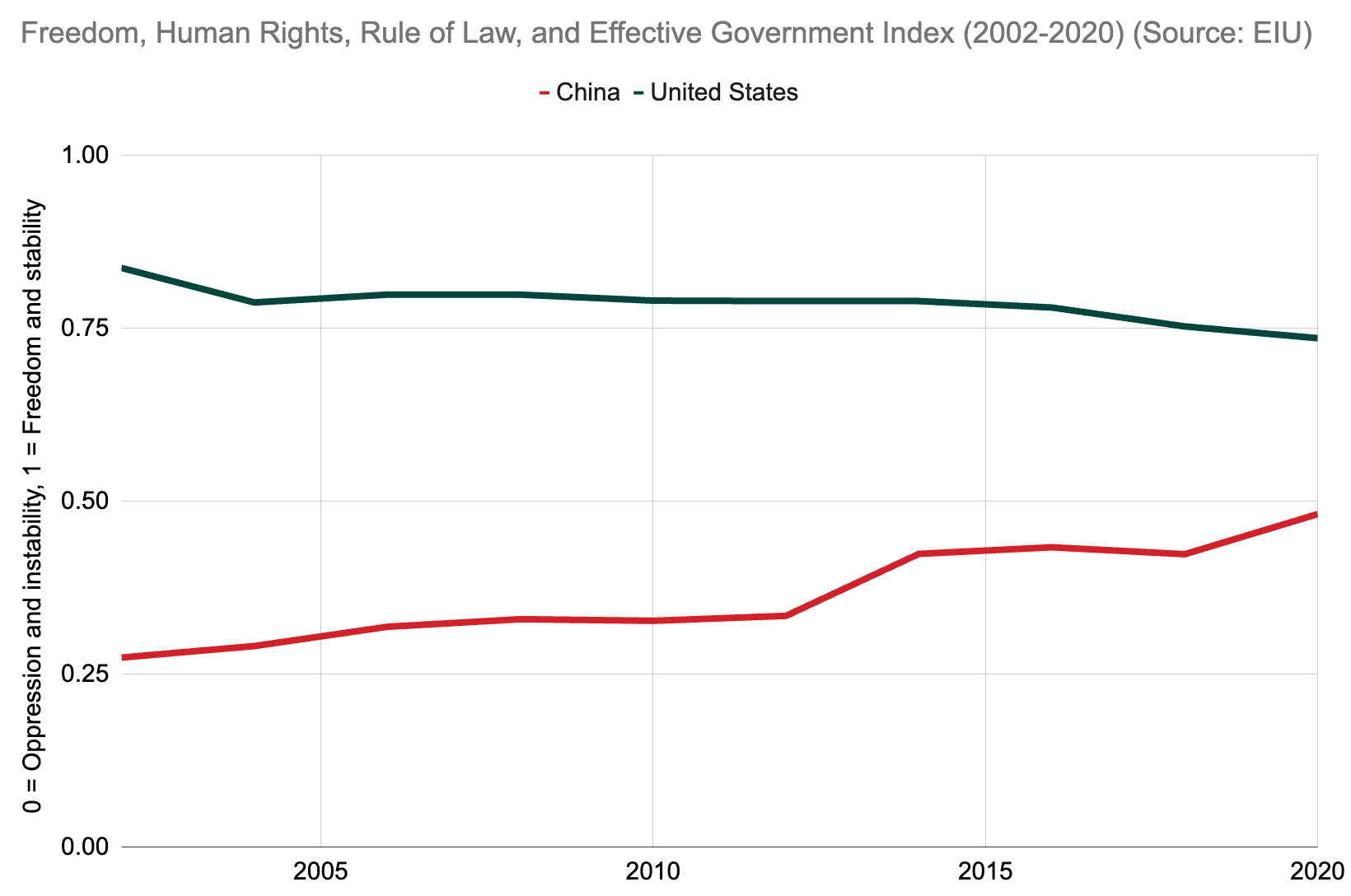The following letter is adapted from remarks delivered at the Upper School assembly in Brauer Auditorium on Friday, November 4.
A couple of questions popped into my mind back in the summer when I was anticipating the school year and thinking about the state of the world in 2022. Specifically, I wondered what percentage of humanity enjoys freedom in their everyday lives. Relatedly, how many governments around the world are highly functioning democracies?
I began to poke around a little and discovered that the Economist Intelligence Unit, a division of the Economist magazine, has been tracking and quantifying this kind of information since the early 1990s. Specifically, for every nation in the world, the Economist begins by attempting to measure several aspects of openness and accountability within societies, such as the defense of human rights, the universality of civil freedoms, and the transparency of government officials. They also measure political stability by monitoring the peacefulness of transfers of power and public demonstrations, the prevalence of social unrest, and the level of external or internal terrorist threats or international conflicts. They quantify bureaucratic competence and efficiency as well as fairness of competition and taxation, and they look at the strength of the rule of law, analyzing the impacts of violent and organized crime, the impartiality of the judicial process, and the protection of property. Finally, they consider the extent of government corruption. In aggregate, these attributes are measures of how desirable it is to live, work, and thrive in any given country.
I decided to pull all Economist data in this area of research for the last 20 years, and what I found was a slow but steady rise of the world’s population from conditions of oppression and instability, represented by a 0 on the vertical axis, to conditions of freedom and stability, represented by a 1.

According to this analysis, Norway is closer to being a free and stable society than any other nation in the world. Conversely, Libya, whose people have endured two civil wars since 2011, is presently the most oppressive and least stable society on Earth. The data reveal many success stories, such as that of Colombia, a country which during my childhood in the 1980s was deeply identified with the drug trade and related violence, but which has since witnessed steady improvement and now enjoys freedom and stability at levels well above the global average. Similarly, quality of life and integrity of government in the former Soviet Socialist Republics and Eastern Bloc nations, which were among the world’s most oppressed populations in the mid- to late-twentieth century, have sustained their rise after the dissolution of the Soviet Union in 1991 and now outperform the global average. China and India, which together account for 36% of the world’s population, deserve mention as well. Their steady improvement away from conditions of oppression have had an elevating impact on the global average, even as they have exceeded that average in the last few years.
The trend in the United States, regrettably, has moved in the opposite direction, and it is on this development that I hope to focus your attention most directly today, especially as we anticipate Tuesday’s elections. At a time when the social and political conditions of humanity are, on average, improving, it is jarring to witness the decline of these conditions in a nation that is synonymous around the world with freedom, rights, and democratic government. This decline is particularly concerning relative to the rise of China, our principal geopolitical rival and a nation whose concept of the relationship between the individual and society differs notably from our own. The strength of the counter-argument of “the American way” has been waning in recent decades, and we would be wise to confront this reality. There is always, after all, hope for tomorrow.

My title slide alluded to a phrase with which you may be familiar: “the arc of the moral universe.” The words originate in a sermon by the American abolitionist minister Theodore Parker. “I do not pretend to understand the moral universe,” he wrote. “The arc is a long one. My eye reaches but little ways. I cannot calculate the curve and complete the figure by experience of sight. I can divine it by conscience. And from what I see, I am sure it bends toward justice.” Parker emphasizes his smallness relative to the universe: “My eye reaches but little ways.” It is a smallness to which every individual can relate. “Of course I don’t like it,” you might be thinking, “that the United States is trending in the wrong direction, but what can I do about it? I am only one person.” I am aware as well, of course, that most of you listening here do not yet even have the right to vote.
Maybe Martin Luther King Jr’s paraphrase of Parker’s sermon, which he had encountered in his education, is the more inspiring version: “The arc of the moral universe is long, but it bends toward justice.” King’s faith in the inevitability of justice is what gives his summary of Parker’s words its extraordinary power, and we witness King’s prophecy in the steady rise of justice and freedom across humanity as a whole. I would encourage you to keep King’s sentiment in your heart when Tuesday comes around. I hope his words will make you feel even in your smallness, as they do me, not inconsequential but essential to the arc of history.
I have recently enjoyed reading a book by Jill Lepore called These Truths. The principal impression it has made on me is that we have almost constantly been a nation of people and parties strongly at odds with each other. In 1786, Jane Franklin Mecom complained to her brother Benjamin Franklin about the disputatious character of political discourse at that time, when our federal republic was proving so very difficult to establish. “I wish our poor distracted State would attend to the many good lessons which have been frequently published for their instruction,” she wrote, “but we seem to want wisdom to comply with our duty. We keep always in a flame.”
For his part, Franklin worked hard to steer people with competing interests and perspectives toward compromise. At the age of 81, addressing George Washington at the Constitutional Convention, he said, “Mr. President, I confess that there are several parts of this Constitution which I do not at present approve, but I am not sure I shall never approve them. For having lived long, I have experienced many instances of being obliged by better information, or fuller consideration, to change opinions even on important subjects, which I once thought right, but found to be otherwise. It is therefore the older I grow, the more apt I am to doubt my own judgment, and to pay more respect to the judgment of others.»
Benjamin Franklin, as Jill Lepore reminds us, was the only person to sign the Declaration of Independence, the Treaty of Paris that ended the American Revolution, and the Constitution. His influence and intellect were indispensable to the founding of our country, and we would improve ourselves so considerably if we would only listen to his wisdom: to doubt one’s own judgment, and to pay more respect to the judgment of others. I certainly believe that his perspective aligns with our own values at MICDS. I do not doubt that you are practitioners of thoughtful listening and self-reflection in your everyday interactions with one another, both in class and out. You give me great hope for the future of our country and the reversal of the present descending “civil society” trend.
The Irish playwright George Bernard Shaw was also in his 80s when he observed that “progress is impossible without change; and those who cannot change their minds cannot change anything.”
For your moment of reflection today, I would ask you to ask yourselves whether you, like Benjamin Franklin, are open enough to opposing ideas that you are “not sure you shall never approve” of things that you disagree with now. Please take a moment to reflect: How capable are you of changing your own mind?
Always reason, always compassion, and always courage. My best wishes to you and your families for a joyful weekend.
Jay Rainey
Head of School
